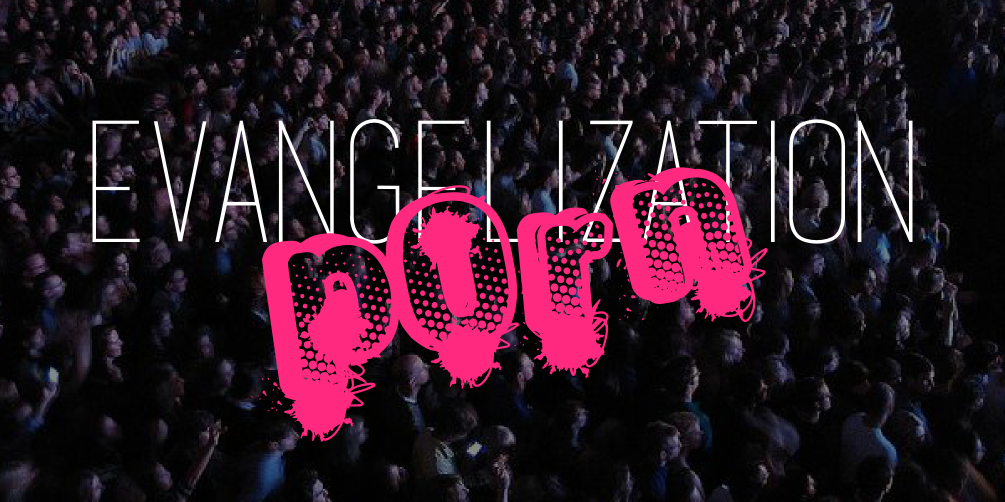Helping Catholic Parish Ministers unlock their ministry and defeat burnout forever. ❤️🔥
Evangelization Porn
If you were enjoying a great weekend with friends and told them you were thinking about building a nuclear fusion reactor in your backyard, like this kid did, chances are most of your friends wouldn’t have much advice to give you. “Um, be careful…” But if you told them you were thinking about building a shed in your backyard, if you have friends like mine, most of them would give you some advice. It probably wouldn’t all be good advice. Some of your friends might argue about trivial things like the materials you should use, or the location in your backyard, or the color you should paint the shed, for example.
I’ve been in situations where a group (staff meeting, team, ministry, friend group, family, etc) is discussing how best to do something. Interestingly, there are always far more people speaking who have never built a shed, than people who have. Most times the small trivial details become the focus of the hot debating in a room full of people who have never built a shed or at least don't build sheds very often.
Why won't anyone speak up when you talk about the difference between a slow carb, low carb, and paleo diet, but everyone, even the physically and obviously hypocrite, are willing to give you exercise and nutrition advice in general?
Its because things that are easy for us to get our minds around and visualize we take for granted we know how to do. Things that seem hard and complex that we obviously have no idea about, we just assume we wouldn’t know the first thing to comment on. If we think something is simple, (Calories in = calories out. Exercise more. Eat less crap.) it is easier to criticize and critique it. If something is difficult and complex, its much harder to constructively critique it as a whole, so we focus on the easy and trivial parts. And plus we've seen a lot more people try to build a shed than build a nuclear fusion reactor. (See Parkinson's Law of Triviality.)
Is evangelization turning into the shed of the Catholic world? Maybe. Maybe we've seen so many different attempts at evangelization we're tempted to think its not really that hard in practice. Maybe we feel like we know how it should be done, because we know how WE came to have whatever faith-life we currently have. Maybe its just in the circles of Church ministers I run in. Or maybe its just me.
Or maybe it is such a difficult and complex topic that we get caught up talking and arguing about the easy and trivial aspects we can easily get our minds around. Its way easier to debate the color of a shed than focus on the difficult endeavor of building a nuclear fusion reactor.
There is a type of Evangelization Porn that is being consumed in large quantities by people in the Church. Sometimes even good quality stuff can turn into Evangelization Porn. It really has more to do with the consumer than with the producer. You don’t know you’re making Evangelization Porn as you make it. But you know you’re making Evangelization Porn if the majority of the people who participate and listen and read and attend and watch and participate never go out and actually do it. They never go evangelize.
It feels good to consume Evangelization Porn. You feel like you’re doing your part and you get the adrenaline-pump that comes with thinking about doing anything really worth doing. But the truth is its way easier to attend a conference, or listen to a talk, or write a tweet, or read a book, or write an article, or share a picture on Facebook, than it is to evangelize. That's the lure of Evangelization Porn. It only involves you. Its safe. There is no other person involved.
Dealing with a person who desperately needs Jesus in their life is hard. Its draining. It often requires loving someone for a long time. It often requires hearing things that don’t make sense to you and that you don’t agree with. It is seldom easy or not messy. It always requires lots of prayer. It is always draining. It frequently is as un-glorious as changing diapers, or going to lunch with your sister, or being charitable to a stranger.
The tempting thing in arguing passionately about the methods and modes of evangelization is it feels rewarding. You feel like you are really working. Like you are really evangelizing. When really all you’re doing is getting caught up in butt-slapping and hanging out with the choir you’re preaching to. (Never, ever, using those two phrases in conjunction again.)
Evangelization porn doesn't bear fruit. Nothing gets accomplished. No one is being loved. No other person is involved. It is self-amusement. It is fantasizing about evangelization.
Evangelization always requires another person. You can tell you’re starting to make Evangelization Porn when you start talking about “people” instead of a person. You can tell you are starting to get addicted to Evangelization Porn when you are consuming more than you are doing.
Here’s some quick math to help diagnose Evangelization Porn Addiciton:
#1 How many pro-life articles have you read this month: #2 How many times did you do something about it this month:
#1 How many times this year did you consume news or media in general and get mad about the “gay agenda", or consume media arguing against same-sex marriage, homosexual relationships, etc?: #2 How many times this year did you talk to someone struggling with same sex attraction issues or living a gay lifestyle?:
#1 How many books this year did you read on the subject of evangelization? #2 How many times this year did you pray with someone you know?
#1 How many times this week did you use phrases or words like the culture, culture war, culture of death, relativism, feminism, intolerance, agenda, liberal, conservative, orthodoxy, or heresy? #2 How many minutes this week did you expose yourself to ideas you disagree with NOT being explained by people you agree with?
#1 How many times did you read apologetic materials? #2 How many people who don’t already attend a Catholic Church did you talk to this year about the way your faith has impacted your life?
#1 How many talks about Jesus did you give this month to a crowd? #2 How many hours did you intentionally spend with a person who really needs Jesus?
Instructions: Divide the first number by the second number: If the number is less than 3 than you are probably doing a pretty good job staying away from evangelization p0rn. If the number is 1 or less than you’re a hero. Or you don’t have internet. If the number is greater than 3 than you are probably addicted to Evangelization P0rn.
Full Disclosure: My numbers suck. I'm mildly addicted to evangelization porn. The first step is admitting you have a problem. The second step is prayer. The third step is to stop consuming and get out there and do something.
"Love in action is a harsh and dreadful thing compared to love in dreams..."
-Dostoevsky
"The devil frequently fills our thoughts with great schemes, so that instead of putting our hands to what work we can do to serve our Lord, we may rest satisfied with wishing to perform impossibilities.”
-St. Teresa of Avila
[Audio] Ignite XLT Talk
 [audio http://catholicyouthminister.files.wordpress.com/2013/10/ignitexlt-edmundmitchell10-6-2013.mp3]
I'm blessed to be part of a new ministry starting up in Toledo called Ignite XLT. It's a Sunday evening gathering of all the local Catholic youth ministries for a time of fellowship, prayer, a talk, Adoration, and praise and worship. Last night we had our first night of XLT and God showed up big time. I gave a talk on identity and purpose and how these necessary components of a fulfilled life are only found in new life in Jesus Christ.
[audio http://catholicyouthminister.files.wordpress.com/2013/10/ignitexlt-edmundmitchell10-6-2013.mp3]
I'm blessed to be part of a new ministry starting up in Toledo called Ignite XLT. It's a Sunday evening gathering of all the local Catholic youth ministries for a time of fellowship, prayer, a talk, Adoration, and praise and worship. Last night we had our first night of XLT and God showed up big time. I gave a talk on identity and purpose and how these necessary components of a fulfilled life are only found in new life in Jesus Christ.

[VIDEO] My Witness Talk at Catholic Family Land
[youtube=http://youtu.be/6AWu9ihgrG4] I had the immense joy of being asked to share my witness at Catholic Family Land this past summer. I pray God blesses you with it.
Checkout Catholic Family Land here.
The Annoying "Yes" Lady at Mass
 Due to many scheduling conflicts a few Sundays back, I went to Mass by myself without the wife and kids. Over the past month or so we began to notice a curious and regular disruption at the 9:30 a.m. Mass. The weird part was, I began to take a strange pleasure in it. It went something like this:
Due to many scheduling conflicts a few Sundays back, I went to Mass by myself without the wife and kids. Over the past month or so we began to notice a curious and regular disruption at the 9:30 a.m. Mass. The weird part was, I began to take a strange pleasure in it. It went something like this:
Priest prays out loud, "May the Lord accept the sacrifice at your ha-"
"YES LORD," interjects the affirmation from what sounds like an old African-American woman somewhere in the pews to the far back and right.
And it continues...
"For the praise and glory of your name..."
"YES LORD."
"For our-"
"YES."
"-good and the good-"
"YES."
"-of all our Church."
"YES LORD."
And it goes on and on like that, with the older lady interceding between every ten or so words from the Priest. Heads everywhere are trying to make clandestine surveillance of the pews around them without making it obvious that they are clearly distracted and pissed off.
Now I'm not going to lie, the first time my wife and I heard the Yes Lady we did what every other couple did. We looked at each other with faces of smirky inconvenience and gossiped after Mass about how obnoxious and distracting this woman was being, resolving that SOMEONE had to do SOMETHING.
I mean holy righteous anger batman! We are trying to PRAY here!
But this Sunday was different. Right around the Eucharistic prayer I noticed a small but steaming pile of self-righteous indignation in my pew. Curious, I kicked it up under the pew in front of me and listened again to the Yes Lady.
"Make holy, therefore, these gifts, we pray, by sending down your Spirit upon them like the dewfall, so that they may become for us the Body and Blood of our Lord, Jesus Christ."
"YES."
A quick burst of willful naivete shot through my brain and I asked a question based on giving the Yes Lady the benefit of the doubt:
What if she really believes she is doing something important?
Suddenly I felt angry. I was angry at anyone who was angry at the Yes Lady. I was angry at the 59% of U.S. Catholics who don't attend Mass weekly. I was angry at the 62% of U.S. Catholics who don't claim a strong religious identity. I was angry at the 29% of U.S. Catholics who don't believe in a personal God. But most of the anger was aimed at myself, because I suddenly became ashamed that I felt so entitled to a distraction free Mass.
What do Catholics who leave the Church to join a Protestant denomination say one of their biggest reasons for leaving is? "My spiritual needs are not being met."
DISCLAIMER: There is a big conversation we could have about the discrepancy between a person's perception of not being spiritually fed, and the actual reality of the depth of spiritual fullness made available in the Catholic Church. And I could fill a hard drive with reasons why I don't think anyone should be constantly giving their public verbal consent to the Eucharistic Prayer. I'm not saying active participation must be busy participation.
But do we, who know the sublime reality of Mass, worship like we are being spiritually fed?
As I honestly examined my frustration with the Yes Lady, I realized I was really just frustrated by the notion of anything "happening" at Mass.
I watched the Priest raising up our gifts and the work of our hands - the bread, the wine, and all intentions we lay at the altar - but part of me didn't really expect God to accept them. I heard the Priest calling the Holy Spirit down on the altar with the conviction of Elijah, but part of me would have been inconvenienced by a rush of wind and tongues of fire. I heard the Priest imploring the help and intercession of an army of Saints, but part of me didn't really want them to show up. I cried aloud telling the Lord I'm not worthy for him to enter under my roof, begging Him to only say the word and heal me, but part of me didn't believe He could actually deny me. I waited mere minutes as we shuffled to the front of the Church to hold the endless, to consume the unconsumable, to swallow the sea, to insert infinite love into my size 34 waist, like a candle trying to hold the Sun, but part of me would be impatient if anyone took longer than seconds to take their wafer and move on.
Who is really being inconvenienced here anyways? Me? The guy who wanted a woman with expectant faith to shutup so I could go back to thinking my own thoughts during Mass?
Or God, who sits through Mass revealing Himself lovingly through His Son, humbly through bread and wine, vulnerably through His death on a Cross, and intimately through bodily communion, only for people like me to look on with blank stares like we're checking email? I've sent prayers to God soaked in tears asking Him to stop being so distant, and the next day been so impatient with a Priest who fumbled slowly through the Mass you would have thought if God himself showed up I'd tell Him to keep His homily short.
Thank God for the Yes Lady. I think only Yes Ladies get healed by Jesus. I think Yes Ladies walk out to Jesus on the water. I think the upper room was full of Yes Ladies at Pentecost. I think Yes Ladies' prayers heal the sick. I think Yes Ladies convert cities. I think only Yes Ladies can be tortured and martyred for Christ.
Is this a call for everyone to go all Southern Baptist this Sunday at their local parish? No. Please no.
But lets smile at the Yes Lady.
Because thanks to her, I pray more often for God to show up.
I pray more often for liturgical inconveniences.
(Photo by Cameron Zohoori)
Guest Post: Pabst Blue Ribbon and Other Good Things I Plan on Enjoying in Heaven
 Christianity that is not entirely and altogether eschatology has entirely and altogether nothing to do with Christ. - Barth
Christianity that is not entirely and altogether eschatology has entirely and altogether nothing to do with Christ. - Barth
[This post is the result of a fascinating 2 hour conversation Greg and I had a few weeks ago. I couldn't resist forcing him to write some of his ideas, observations, and insights down in a glorious guest post. Enjoy. Hopefully we'll be hearing from Greg again soon!]
Karl Barth wrote those words some 80 years ago, and judging by this criterion, I’m left wondering if the 21st century Catholicism I hear spoken of every day has anything to do with Christ. For too long non-biblical language has plagued traditional thinking, writing, and preaching regarding salvation, heaven, and consequentially, the human person. The “Kingdom of God” has become a synonym for “Heaven” - the “spiritual”, gaseous place you go when you die (if you’re lucky) - and the Cross and Resurrection have been watered down to simply mean “Jesus opened heaven for us”. “Heaven” has become equated with “good”, and “earth” equated with “bad”. Christians talk joyfully about the hope of “heaven” and “eternal life” as the ultimate fulfillment of all of man’s desires, while non-invested Modern Man watches on from the other side of the glass, careful not to tap on the window, severely doubting the idea of some disembodied “eternal life” awaiting us and greatly questioning whether he would even want to go there.
He realizes something is wrong with the Christian’s message. There’s no way the expanding Cosmos worked so hard, for so long, just to produce self-aware beings that could one day die and escape this mess for eternal bliss. More so, how in the world is it fair, or just, or great, for God to “reward” our suffering here in our bodies with some sort of disembodied, “spiritual” existence in Heaven? No. Nonsense. Better to face the grim reality of decay and entropy: these carbon-based bodies simply die, and one day the universe will either collapse back in on itself or continue expanding fruitlessly into the cold abyss. Escapism can’t be the answer.
And, well, he’s right. The point of the Resurrection is not “we can go to heaven now”. The Resurrection is the beginning of God’s new universe. The sooner we get this right, the sooner we can enter into meaningful dialogue with those around us, offering a Hope worth living for.
“The Resurrection is a wondrous event which is not only absolutely unique in human history, but which lies at the very heart of the mystery of time.” – JPII, Dies Domini, 2.
A brief look at the New Testament offers a radically different hope than the one often preached. The significance of the Resurrection in the New Testament is not that Jesus “died and rose so we can go to heaven when we die”, but rather God is going to do for us, and for the entire Cosmos, precisely what He did for Jesus; namely, Resurrection. The Resurrection means, ultimately, that God’s New Creation has finally been launched. The risen Jesus is the “first fruits” of this New Universe, and one day God is going to harvest the rest of His crop (us). In 1 Corinthians 15 Paul speaks of our current fleshly bodies being sown in the earth to one day be raised as “spiritual bodies” -- meaning these very bodies will be animated by God’s Spirit, not “spiritual” in some non-physical, gaseous sense – and in Romans 8 he speaks of our redemption as simultaneously the redemption of Creation. Combine these verses with the “New Heavens and New Earth” of the book of Revelation, mix in 2000 years of theological reflection and scientific progress, and you get this Eschatological take from the CCC:
1042: At the end of time, the Kingdom of God will come in its fullness. After the universal judgment, the righteous will reign for ever with Christ, glorified in body and soul. The universe itself will be renewed:
The Church . . . will receive her perfection only in the glory of heaven, when will come the time of the renewal of all things. At that time, together with the human race, the universe itself, which is so closely related to man and which attains its destiny through him, will be perfectly re-established in Christ.
1043 Sacred Scripture calls this mysterious renewal, which will transform humanity and the world, "new heavens and a new earth." It will be the definitive realization of God's plan to bring under a single head "all things in [Christ], things in heaven and things on earth."
1044 In this new universe, the heavenly Jerusalem, God will have his dwelling among men. "He will wipe away every tear from their eyes, and death shall be no more, neither shall there be mourning nor crying nor pain any more, for the former things have passed away."
In other words, Jesus is going to be bringing Heaven with Him. The Resurrection launched the beginning of God’s New Creation, but in the end, Heaven will come in full. “Knowledge of the Lord” will cover the cosmos like “waters cover the sea” (Isaiah 11:9). Scripture uses an analogy for what will occur between Heaven and the Universe: marriage.

“The Resurrection of Jesus is the seminal event from which the New Creation has already begun to grow.” – John Polkinghorne
The pattern for this great act of Resurrection is the Resurrection of Jesus. The Risen, glorified Jesus appears in the Gospels in varying scenarios, but there is one strand that runs though all of the accounts: the disciples fail to recognize Him at first, only to come to realize that it is indeed Jesus after some act of His. He is clearly different, but also clearly still Himself. He passes through walls and appears at will, but also eats with them and allows them to touch His wounds.
So it will be with us. We will receive transformed, glorified bodies. I will still be Greg, but Glorified Greg. More shockingly (grab your hats), so will it be with the universe. Matter, space, and time are the form for this current cosmos, and we ought to expect some form of these three in the “world to come” that we profess hope in each Sunday (though the third part of that triad is admittedly contestable). We will live in a new world, after all. In this new universe, God will have his dwelling among men. It’s going to be a glorified party (the Wedding Feast of the Lamb is not a Baptist wedding). There will be glorified adventure to be had. My friends (God-willing) will be gloriously there. I’m going to drink glorified PBR. I’m going to go glorified whitewater rafting down the glorified rivers of Maine. Perhaps I’m getting a bit carried away (I’m definitely getting carried away) -- The point is, as author/physicist/theologian/Anglican priest John Polkinghorne reiterates: nothing good is lost in the Lord. Polkinghorne recounts a particularly poignant story: When asked what he would do if he was told the world would end tomorrow, Martin Luther replied, “I’d plant a tree.” Bingo. Nothing good is lost in the Lord.
Such is the grandeur of Christian hope. Rather than allowing the expanding universe to collapse back in on itself or ceaselessly expand into desperate nothingness, the Resurrection tells us that God has given a definitive Yes to His good Creation. In a divine act of Resurrection, all things will be made glorified, and man will live forever in this new universe. This is Heaven. This is Christian Hope. The challenge for us 21st Century evangelically minded Catholics (Hey, Weigel) is, I think, to recover this language of Resurrection and New Creation. We ought to be joyfully inviting others to be challenged by the Resurrection: Why live your life running from pleasure to pleasure or giving the finger to the expanding cosmos in despair when the hope of the Resurrection is knocking on your door?
A preoccupation with the “Four Last Things” handed on to us from the Medieval era has minimalized the importance of Resurrection, making it, at best, a strange bonus add-on to “Heaven”. This isn’t Biblical, and especially since Vatican II, it isn’t Church teaching either. Yes, we believe that when one dies their soul goes to be with God and they behold the Beatific Vision while they await their resurrected bodies, and yes, we can refer to this as “Heaven”. But if we speak as though this is the goal of Christian life, we are literally castrating the Gospel: we are robbing the Resurrection of its potency.
One last point; God has redeemed us entirely, as persons. The Resurrection tells me that God loves me so much, as Greg, that He desires to be with me in all of my awkward Arabic hairiness, receding hairline and all (although I expect that to be corrected in my future glorified awesomeness). He didn’t merely “save my soul” – body/soul dualism is blatantly rejected by Scripture – He saved me. This also means that what we do in the body matters: this is why Theology of the Body (and the 1st Letter to the Corinthians) exists. But I’m getting ahead of myself. The practical impact of the Resurrection on Christian living is the topic of my next post.
Greg is a MA Theology student at Providence College in Providence, RI. Follow @gchurst.
Interested in learning more? CCC 988-1019, 1042-1050 International Theological Commission: Communion and Stewardship N.T. Wright’s Surprised by Hope John Polkinghorne’s The God of Hope and the End of the World JPII Dies Domini 2
Coffee Interviews: Jon Weiss and Family Missions Company
[youtube=http://youtu.be/A0BU5TUCMZw] Coffee Interviews is a series of video interviews of interesting people I would love to have coffee with and pick their brains.
Today I got to speak with Jon Weiss from Family Missions Company, a ministry where entire families move to third world countries for extended periods to minister to the local community. This is a powerful ministry of men, women, and children radically living out the call to "Go, make disciples of all nations" Matthew 28:18
Topics Covered
What is Family Missions Company? How do large families do mission work in third world countries? Spiritual poverty in the West How can families be more missionary focused?
Various Schtuff Mentioned
"The Christian family is a communion of persons, a sign and image of the communion of the Father and the Son in the Holy Spirit. In the procreation and education of children it reflects the Father's work of creation. It is called to partake of the prayer and sacrifice of Christ. Daily prayer and the reading of the Word of God strengthen it in charity. The Christian family has an evangelizing and missionary task." Catechism #2205
Coffee Interviews: Lay Evangelist Michael Gormley
[youtube=http://youtu.be/QWiKj8oohm4] Coffee Interviews is a series of video interviews I hope to bring back to this blog. Here's a blast from the past for you to enjoy. *p.s. - Who would you want to see interviewed next?
Today I got to speak with Michael Gormley (AKA Gomer) about his life as a "sort of" full time lay evangelist. This guy's sharp and knows his stuff. He gives some great insights and this hour interview is jam packed.
Topics Covered
Gomer's Background and How His Ministry Started The New Evangelization as Middle Ground The Needs of Modern Man Missing the Personal Element of Evangelization Studying Comedians to Learn How to Engage Modern Man The Best Way to Introduce Modern Man to Life-Changing Discipleship Changing People in the Pews, Not Just Politics of the People Christian Morality as an Art of Living Advice to Those Discerning a Call to the Public Ministry of Evangelist The History of Lay Ministry
Various Schtuff Mentioned
layevangelist.com youcatholic.com Research on the Average Spirituality of Teens in America (Moral Therapeutic Deism) Decree on the Apostolate of the Laity Dedication and Leadership by Douglas Hyde Back to Virture by Peter Kreeft The Christian Philosophy of St Thomas Aquinas by Etienne Gilson
"Lay people also fulfill their prophetic mission by evangelization" Catechism #905
"And he gave some as apostles, others as prophets, others as evangelists, others as pastors and teachers" Ephesians 4:11
##P.S. Who would you want to see interviewed next?
[Video] Dual Wielding: Bible and Catechism
[youtube=http://youtu.be/PV4tfoHq1HI] I wanted to personally share a method of reading the Bible with the Catechism that opens up the depths of the faith to you, and is also pretty exciting to do.
Dual Wielding: Just Like in Halo
I call it "Dual Wielding the Bible and the Catechism" because it sounds epic that way. Basically it is reading the Bible through the lens of the Catholic Church, using the Catechism of the Catholic Church.
I've written about this way of reading the Bible through the lens of the Catechism, but here it is in a different medium. (My first foray into creating videos...go easy on me!)
I felt really called to explain this in person to you, and I hope it blesses you. Let me know if you try praying through the Bible and the Catechism this way.
Leave a comment, send me a tweet @edmundmitchell #dualwielding, or email me at contactedmundmitchell@gmail.com
Chiara Badano - Between the Pint and the Cross Ep. 5

[audio http://catholicyouthminister.files.wordpress.com/2013/06/btc-chiara.mp3]
Edmund podcasts sick as a dog from a car in a Starbucks parking lot, while Chris sips delicious beer. We talk about a freaking awesome future Saint from the recent past.
Pope Benedict in all his Comic Sansieness: http://www.vatican.va/bxvi/omaggio/index_en.html
Music: "Deeper" by Matt Cranley, Sean and Brendan Tobin. Check out Matt at https://soundcloud.com/matthew-cranley
Email us! betweenthepintandthecross@gmail.com
Check out the website at thepintandthecross.wordpress.com
This Story about Pope John Paul II is Changing My Life
 I recently heard a remarkable and supposedly true story involving Blessed Pope John Paul II and his driver, and this story has been haunting me for the past few weeks.
I recently heard a remarkable and supposedly true story involving Blessed Pope John Paul II and his driver, and this story has been haunting me for the past few weeks.
The story goes that Pope John Paul II was getting out of a car and his driver accidentally slammed the Pope's fingers in the car door. What a great opportunity to see what someone is really made of. My Dad slammed my fingers in the trunk of a car one time, that was the first and last time I ever swore in front of my Dad. I'm still afraid of trunk space.
Legend has it that the first whispered words out of Pope John Paul II's mouth were: "Thank you, Lord, for loving me this way."
I don't know about you, but this story rocked my face off. In a situation where you are suddenly slammed into abrupt pain - stub your toe on a chair, poke yourself in the eye with your toothbrush, or reach down to pick up your shoe and slam your eyebrow on the kitchen counter - what comes out of your mouth comes straight from your heart. It is more a knee-jerk reaction than well thought out intellectual response. A lot of my reactions to situations like these seem to be four letter words...
This story reminds me of Jesus' words:
"The good man out of the treasure of his heart produces good, and the evil man out of his evil treasure produces evil; for out of the abundance of the heart his mouth speaks." Luke 6:45
Situations like these are opportunities to see what you are really made of, and to see what is really in your heart. If you live a life like Pope John Paul II, you are constantly aware that every moment of your life is a gift from God. Your heart is overflowing with love for God, and a constant awareness of His love for you. Everything God allows to happen to you is for your good.
Suffering, pain, disappointment; these things are given to us to bear because these things will make us Saints. Becoming who we are created to be hurts, because we are weak and would rather seek pleasure than love. Even the small moments of life give us opportunity to grow closer to Christ, to love God more, and to overcome our little sufferings and crosses with the grace and love of Jesus Christ working in us.
The past few weeks I have been trying to respond to the little difficulties and sufferings in my life by quietly saying "Thank you, Lord, for loving me this way."

"The way of perfection passes by way of the cross. There is no holiness without renunciation and spiritual battle. Spiritual progress entails the ascesis and mortification that gradually lead to living in the peace and joy of the Beatitudes." Catechism of the Catholic Church 2015



